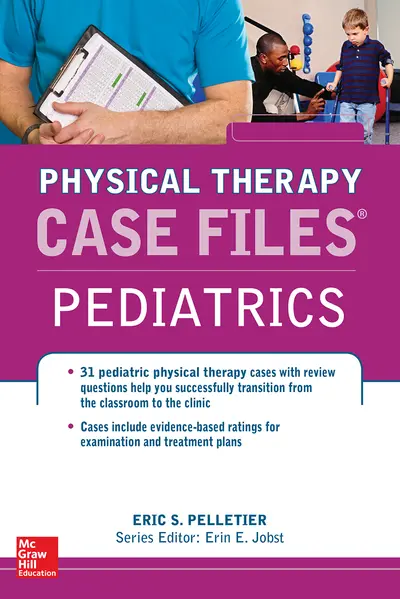My Account Details

ISBN10: 0071795685 | ISBN13: 9780071795685

Step 1 . Download Adobe Digital Editions to your PC or Mac desktop/laptop.
Step 2. Register and authorize your Adobe ID (optional). To access your eBook on multiple devices, first create an Adobe ID at account.adobe.com. Then, open Adobe Digital Editions, go to the Help menu, and select "Authorize Computer" to link your Adobe ID.
Step 3. Open Your eBook. Use Adobe Digital Editions to open the file. If the eBook doesn’t open, contact customer service for assistance.
Publisher's Note: Products purchased from Third Party sellers are not guaranteed by the publisher for quality, authenticity, or access to any online entitlements included with the product. Thirty pediatrics physical therapy cases sharpen students’ critical thinking skills and prepare them for real-world practice This unique review features case studies that help physical therapy students successfully transition from coursework to clinical work. Each case includes a discussion of the health condition, examination, evaluation, diagnosis, plan of care, and interventions, evidence-based practice recommendations, and references. NPTE-style review questions accompany each case, reinforcing students’ learning. These case studies give students practical experience before they actually work with patients and helps build the confidence they need to succeed in real-world clinical practice.
1. Brachial Plexus Palsy
2. Spinal Cord Injury
3. Cerebral Hemispherectomy
4. Hemipolymicrogyria: Bracing for Gait
5. Extreme Prematurity and the Neonatal Intensive Care Unit
6. Cerebra Palsy - Early Intervention
7. Cerebral Palsy - Elementary School
8. Cerebral Palsy - Postsecondary Education and Transition to Adulthood
9. Fitness in Cerebral Palsy
10. Down Syndrome
11. Duchenne Muscular Dystrophy
12. Developmental Coordination Disorder
13. Autism Spectrum Disorder: Motor Concerns
14. Anterior Neck Burn
15. Palmar Hand Burn
16. Chronic Wound
17. Congenital Muscular Torticollis
18. Osteogenesis Imperfecta
19. Spina Bifida
20. Acute Lymphoblastic Leukemia
21. Cystic Fibrosis
22. Hemophilia
23. Complex Regional Pain Syndrome
24. Post-Concussion Syndrome
25. Congenital Limb Deficiency: Proximal Femoral Focal Deficiency
26. Relapsed Clubfoot
27. Joint Hypermobility Condition
28. Idiopathic Toe Walking
29. Femoroacetabular Impingement
30. Anterior Cruciate Ligament Rupture: Postoperative Management
31. Medial Epicondyle Apophysitis (Little League Elbow)
Need support? We're here to help - Get real-world support and resources every step of the way.